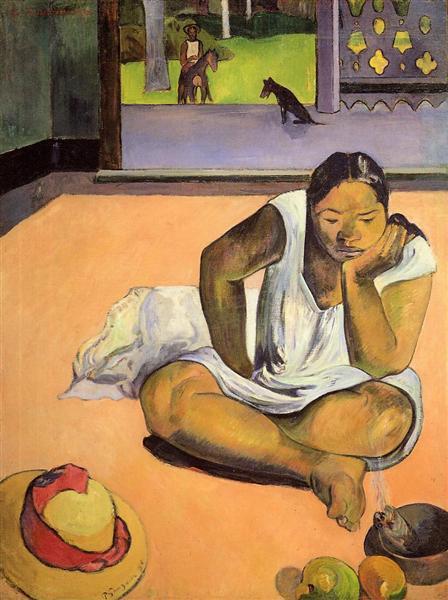Description
Paul Gauguin's Brooding Woman, painted in 1891, stands as a fascinating testament to the artist's emotional and aesthetic exploration, evidencing his transition towards a more symbolic and less naturalistic representation. This painting is a manifestation of the symbolism that Gauguin, in his search for a profound and evocative expression, began to cultivate in his works of this period.
The central figure of the painting is a woman with a melancholic countenance who stands in a hazy environment that complements her emotional state. The woman is presented, for the most part, with an introspective and distant gaze, suggesting an internal turmoil that captures the viewer's attention. Her intense features and the color palette that Gauguin chooses enhance her aura of restlessness and reflection. The use of dark tones, combined with blue and earthy nuances, creates an atmosphere that evokes a certain sadness, but also a beauty squeezed by the tensions of life.
The composition is remarkably balanced, with the figure of the woman centred, allowing the viewer to focus on her emotional state. The background is relatively simple, with fading textures ensuring that the focus falls on the protagonist. The absence of additional information in the surroundings reinforces the uniqueness of her situation, almost as if she is trapped in her own mind, an emblematic representation of the existential conflict that many individuals experience.
Gauguin was a pioneer of the use of non-naturalistic colour and his tendency to distort colours to express individual emotions is clearly evident in this work. The choice of vibrant colours that contrast but also blend into the background allows the figure to stand out with an almost mythical presence. In “Haunting Woman”, the work moves away from mere physical representation and into a more emotional and spiritual realm, seeking to capture the essence of a feeling rather than its literal representation.
Gauguin's cultural influence is informed by his experience in places like Tahiti, although in this particular case, the connection to the exotic may be more implicit. Compared to other works of his time, such as "The Vision after the Sermon," where his symbolism is manifested through a broader narrative, "Disquieting Woman" sustains a singularity that gives the viewer the feeling of being before a fragment of a solitary and contemplative life.
Through his work, Gauguin challenged the artistic perception of his time, seeking a new meaning in female representation. The “Disquieting Woman” is not only a reflection on the female figure, but an intimate exploration of the human being and his relationship with his own emotions and the world. It is a meditative work, a reminder of the complexities of inner life, an element that makes it as relevant today as at the time of its creation. In the context of the development of modern art, this painting can be considered a significant step on the path towards emotional abstraction that defined the work of many artists in the 20th century.
KUADROS ©, a famous painting on your wall.
Hand-made oil painting reproductions, with the quality of professional artists and the distinctive seal of KUADROS ©.
Painting reproduction service with satisfaction guarantee. If you are not completely satisfied with the replica of your painting, we will refund 100% of your money.

